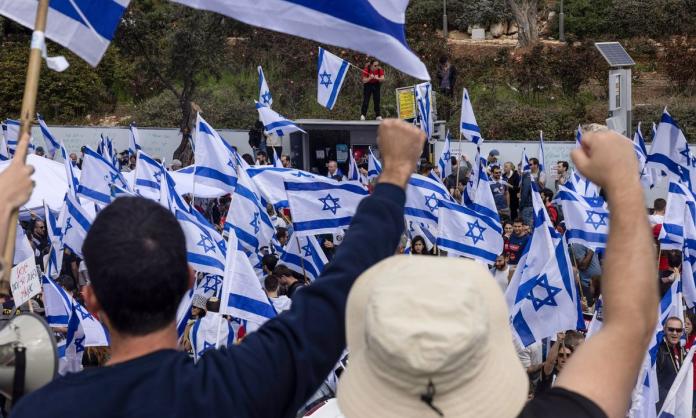There’s a little girl. She’s maybe 8, maybe 10, with huge eyes. In a quiet, little voice, she describes what happened to her in late February in Huwara, a Palestinian town in the West Bank. “We started to hear sounds from outside the house. I moved to the windows in our room but there was shooting so I got onto the floor then they broke the windows”, she tells an Al Jazeera journalist.
This was a child’s eye view of one of the most disturbing incidents in the decades long offensive against the Palestinians by Israelis and their apartheid state. Huwara was the scene of a raid, by Israeli “settlers”—that is, colonists. Hundreds of these Jewish supremacists, claiming to act in response to violence by Palestinians, marched into the town. They took bats and smashed windows. They took petrol, poured it over cars and houses and lit them. They carried guns and fired them into the air. When they saw local Palestinians, they attacked. The scenes are horrific. Palestinians lying, crouched, foetal on the ground. Sobbing.
This was a pogrom.
The Israeli military facilitated the attack by closing off all access to the town in advance and by permitting the mob’s entrance. It also prevented the entry of medics and journalists. Fascist politicians in the Israeli government endorsed the action. “A closed, burnt Huwara—that’s what I want to see”, one said. “I want to see burning villages.”
Other politicians were more “moderate”. They said that what happened wasn’t ideal; that the Israeli military should really be in charge of such operations. And that is what it has been doing: regular bombings of Gaza, increased repression of Palestinians living inside Israel, and attempts to stop the expression of any aspect of Palestinian identity, including flying the Palestinian flag.
It is undeniable that the situation for Palestinians has become more dire over the last decade. The Israeli state has shifted even further to the right. After decades of military occupation, polls and surveys suggest that about 60 percent of Jewish Israelis favour segregation from Palestinian Israelis, and that 60 percent identify as right wing (rising to 70 percent among those aged 18-24).
Since 2018, there has been a great deal of political instability in Israel, reflected in multiple elections for the parliament, the Knesset. (A system of proportional voting results in many parties achieving representation.) The March 2021 election finally led to a government under Naftali Bennett and Yair Lapid, whose majority coalition of liberals and conservatives collapsed in June last year.
The November 2022 election led to another majority government under former Prime Minister Benjamin Netanyahu, the head of Likud, the largest party in the Knesset, with 32 of the 120 seats. This is the most right-wing and religious government in Israel’s history. And it includes fascists. There are currently ten parties in the Knesset. The governing coalition is made up of six.
Likud’s politics descend from Ze’ev Jabotinsky’s pre-World War Two “revisionist”, right-wing Zionism. For pragmatic reasons, in office Likud has distanced itself from Jabotinsky’s idea of a “Greater Israel” including Gaza, the West Bank and parts of Jordan. But it has encouraged and subsidised the colonisation of the West Bank, which is illegal under international law, and has tacitly encouraged colonies that are illegal even under Israeli law.
One of Likud’s electoral bases is Middle Eastern and North African Jews, known as the Mizrahim, which make up 45 percent of Israel’s Jewish population. The party says that it represents their interests against the dominant elite of Ashkenazi Jews (those with European heritage, who are the second largest Jewish group in Israel) and against the Palestinian population.
Netanyahu has four criminal charges against him pending in court, but the cases can’t proceed while he remains prime minister. So he is particularly susceptible to pressure from his coalition partners.
The coalition includes Jewish Power, a fascist organisation whose leader Itamar Ben-Gvir, a colonist in the West Bank and convicted terrorist, is minister for national security. His party is “Kahanist”, using the late rabbi Meir Kahane’s religious justifications for Jewish supremacy. It supports the imposition of “Jewish law” by the state, virulent racism, ethnic cleansing and expansionism through the formal annexation of the West Bank. Kahanists have engaged in terrorism against Palestinians. Kach (“Thus” in Hebrew), founded by Kahane and the political forerunner to Jewish Power, was banned in Israel and the US as a terrorist organisation. In 1995, a Kach associate assassinated Labour Prime Minister Yitzhak Rabin.
Ben-Gvir has led incursions into the al-Aqsa Mosque compound/Temple Mount, one of the holiest sites of Islam and also for some Jews. He has led marches through the Muslim quarter of old Jerusalem and set up an office in the Sheik Jarrah neighbourhood of Jerusalem as colonists were attempting to purge it of Palestinians.
Also in the coalition is the Religious Zionist Party, whose leader Bezalel Smotrich (another colonist, who has called himself a “fascist homophobe”) is the finance minister and is in charge of civilian affairs in the West Bank, responsible for the Zionist colonies. The party wants to impose Jewish religious law on the population. >
After the Huwara pogrom, Smotrich tweeted: “Huwara needs to be wiped out. I think the State of Israel should do it”. He recently gave a speech in front of a map of “Greater Israel” that included territory in Jordan and has said that the Palestinian people are an “invention”. Both tropes go back more than 100 years. The denial of the existence of Palestinians is expressed in the Zionist slogan “a land without a people for a people without a land”.
These two fascist parties ran on a joint ticket and won fourteen seats, becoming the third largest group in the Knesset and the second largest in the government. Palestinian journalist Marwan Bishara noted at Al Jazeera:
“Religious extremists, like ministers Itamar Ben-Gvir and Bezalel Smotrich, are by-products of Israel’s occupation and illegal settlement enterprise, and ... judging from their large and growing following among Israeli youth, they are destined to become very powerful and very dangerous, as the violent apartheid regime persists.”
To implement its agenda, the government announced plans to stack the Supreme Court and limit its ability to override laws. Although the court is right wing, the government’s proposal would not only provide Netanyahu with a personal, legal escape hatch. It would also open the way to even greater repression of Palestinians, women and LGBTI people. The fascists want immunity for Israeli armed forces who commit atrocities in the West Bank.
A protest movement against the proposed judicial change began on 7 January. The first protest attracted more than 20,000 people. But since then, demonstrations have taken place weekly or more frequently, and have grown dramatically.
Israeli forces raided Jenin refugee camp in the West Bank in late January, killing ten people. Such raids are nothing new—Israeli armed forces killed 170 Palestinians, including 30 children, in 2022. But the timing of this raid—and, soon, deadly raids on the Aqabat Jabr camp in Jericho, and later on the city of Nablus—indicates that this was designed to provoke responses from Palestinians and to generate rally-round-the-Israeli-flag national unity.
A month later, two colonists were shot dead by a Palestinian militant near Huwara—exactly the kind of escalation the government wanted. The Huwara pogrom, took place that night.
Yet the government’s efforts to generate a siege mentality and national unity failed: the protests continued and escalated. Doctors, tech workers and others have engaged in strikes. Military reservists have participated in the protests and refused to train. Demonstrators have blocked important roads, including the Ayalon Highway, a major intercity freeway, in Tel Aviv.
According to protest organisers, more than 600,000 participated in protests across Israel on 26 March. And the demonstrators became even more determined after Netanyahu sacked Likud Defence Minister Yoav Gallant for criticising the proposed judicial reforms. (He said that they would undermine Israel’s security.)
The Histadrut union federation called a general strike, which was supported by some large corporations, on 27 March, and ceremonial President Isaac Herzog called for the legislative process to stop. There were also much smaller pro-government protests, encouraged by Ben-Gvir, including in Jerusalem where participants attacked Palestinians.
That night, Netanyahu postponed the judicial legislation for a month and, as a concession to the fascists, agreed to establish a National Guard under Ben-Gvir. It’s worth noting, however, that this was already part of the coalition deal underpinning the government and was an extension of plans developed under Ben-Gvir’s ministerial predecessor in the government of Naftali Bennett. The 2,000-strong National Guard will probably contain officers from the particularly vicious Border Police and will enlist volunteers. It will provide the fascists with a militia to attack Palestinians, and Jewish political opponents of the far right as well.
The government calculated that the postponement would give it time to regain support. A war, or at least increased military conflict might help it to do that. So further murderous provocations are likely. Not only raids in the West Bank and the shelling of Gaza, but also against other states. There has already been an aerial bombing near Damascus in Syria, following earlier missile strikes on Damascus international airport.
The protests have nevertheless continued, demanding that the judicial changes be dropped entirely and that Netanyahu resign. There were more than 165,000 on the streets on 1 April.
The divisions that have emerged in Israeli politics are not over Zionism or even ethnic cleansing. Colonies in the West Bank have been expanding since its occupation during the Third Arab-Israeli War in 1967. An issue is the pace of the process.
Much of the Israeli capitalist class is worried by the outflow of funds from banks and a collapse of foreign investment in the country. Politicians who are not part of the governing coalition fear being permanently excluded from office by further legal changes after the judicial reform is passed. And ordinary Jewish Israelis are worried about the threat to the limited democracy that exists.
But Likud and the fascists either aren’t concerned about the capital flight that the political instability has caused, or think that it will be reversed once they consolidate their position. They are prepared to weather criticisms from liberal Zionists outside Israel and from the country’s staunch allies such as the US.
There was public bickering at the end of March between US President Biden and Netanyahu over the judicial changes. But the alliance is fundamentally sound because Israel remains crucial for US strategy in the Middle East and North Africa, given closer Saudi-Chinese relations. China has brokered a degree of reconciliation between Iran and Saudi Arabia and is the largest purchaser of Saudi oil. So Israel remains the US’s most reliable ally and has the most powerful armed forces in the Middle East.
Some Palestinians and their allies have participated in the protests, but their reception has often been unfriendly, and they have constituted a tiny proportion of the mobilisations, whose participants have overwhelmingly been Zionists.
The judicial reform would increase the oppression of Palestinians and accelerate the colonisation process in the West Bank. It would open the way to the replacement of Israel’s apartheid democracy by an authoritarian regime. So we must oppose it. We can do that while maintaining our support for the Palestinian liberation struggle, criticising the racist and undemocratic basis of the Israeli state and advocating a democratic, secular state in the whole of historic Palestine.











